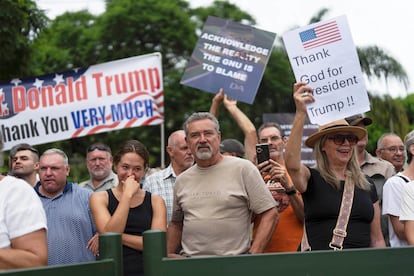What are white South Africans ‘refugees’ in the United States escaping from?
Trump said that the group is a victim of ‘genocide,’ a claim that has been refuted by various groups

On May 12, 49 white South Africans arrived in the United States as refugees, personally welcomed by U.S. officials in a move that has sparked both domestic and international controversy. The Trump administration granted asylum to the group for alleged racial discrimination in their home country, an argument rejected by the South African government, human rights organizations and religious groups.
The refugees, reportedly members of the Afrikaner minority — descendants of Dutch settlers — were greeted at Dulles Airport by Deputy Secretary of State Chris Landau. “Welcome to the United States of America. It is such an honor for us to receive you here today,” Landau said. He praised their “long tradition” and acknowledged the challenges they claimed to have faced in South Africa.
‘Genocide’ accusations
The Trump administration explained that the decision was a response to what it called “genocide” against white South African farmers. “White farmers are being brutally killed,” the president said in the Roosevelt Room of the White House. He referred to reports of farmer murders and land expropriation policies in South Africa, and claimed that white citizens are victims of state-sanctioned racial persecution.
However, South African President Cyril Ramaphosa called the claim “completely false,” and his administration emphasized that crime statistics do not support a pattern of racially motivated violence against whites. According to South African police services, farm-related crimes are not disproportionately directed against white landowners. In addition, the group Genocide Watch has stated that although whites represent about 8% of the population, they make up only 2% of murder victims.
“Genocide has a very clear definition and what is happening in South Africa with white South Africans does not fit the definition at all,” Mandeep Tiwana, director of evidence and engagement at CIVICUS, a South African human rights NGO, told USA Today. “In fact, white South Africans are a privileged minority.”
A history of territorial inequality
The controversy stems in part from South Africa’s fraught racial history. Until the end of apartheid in 1994, the country was ruled by its white minority, due to a system that denied Black South Africans basic civil rights. Today, despite major political changes, the white minority still holds a disproportionate share of land and economic power.
Earlier this year, President Ramaphosa signed a law allowing the South African government to seize land for redistribution, a move intended to address historical inequality but seen by some as an attack on white property rights. Trump cited this legislation as another justification for granting asylum.
Refuge for white people only?
Critics argue that the Trump administration’s embrace of Afrikaner refugees stands in stark contrast to its broader immigration policies. From his first days in office, Trump slashed refugee admissions from countries such as Haiti, Cuba, Venezuela and Nicaragua. He suspended the entire refugee resettlement program, slashed funding, and revoked protections for hundreds of thousands of people fleeing war, gang violence, and political persecution.
In response, activists, including Laura Thompson Osuri, executive director of Homes Without Borders, a Washington-based refugee advocacy organization — who called the administration hypocritical — protested the arrival of the South Africans at Dulles Airport near Washington, D. C.
Response from the Episcopal Church
Major religious organizations that have historically collaborated with the U.S. government on refugee resettlement are expressing strong opposition to the recent decision. The Episcopal Church’s migration ministry announced that it would rescind all of its grant agreements for refugee resettlement after the administration asked it to help settle Afrikaners.
“It has been painful to watch one group of refugees, selected in a highly unusual manner, receive preferential treatment over many others who have been waiting in refugee camps or dangerous conditions for years,” wrote Presiding Bishop Sean Rowe in a public letter. Church World Service (CWS), another key player in refugee resettlement, also condemned the decision.
Sign up for our weekly newsletter to get more English-language news coverage from EL PAÍS USA Edition
Tu suscripción se está usando en otro dispositivo
¿Quieres añadir otro usuario a tu suscripción?
Si continúas leyendo en este dispositivo, no se podrá leer en el otro.
FlechaTu suscripción se está usando en otro dispositivo y solo puedes acceder a EL PAÍS desde un dispositivo a la vez.
Si quieres compartir tu cuenta, cambia tu suscripción a la modalidad Premium, así podrás añadir otro usuario. Cada uno accederá con su propia cuenta de email, lo que os permitirá personalizar vuestra experiencia en EL PAÍS.
¿Tienes una suscripción de empresa? Accede aquí para contratar más cuentas.
En el caso de no saber quién está usando tu cuenta, te recomendamos cambiar tu contraseña aquí.
Si decides continuar compartiendo tu cuenta, este mensaje se mostrará en tu dispositivo y en el de la otra persona que está usando tu cuenta de forma indefinida, afectando a tu experiencia de lectura. Puedes consultar aquí los términos y condiciones de la suscripción digital.









































